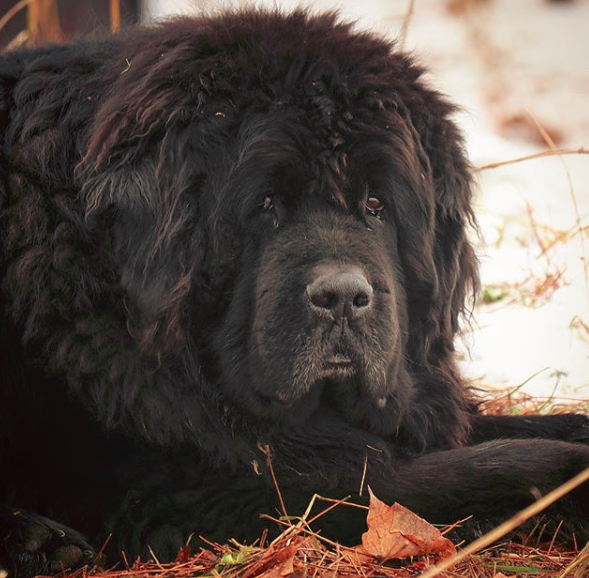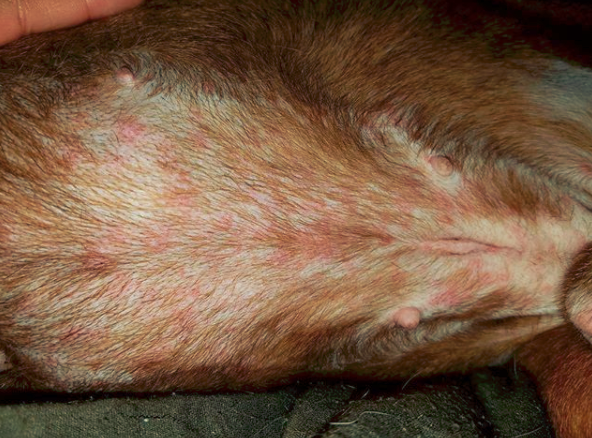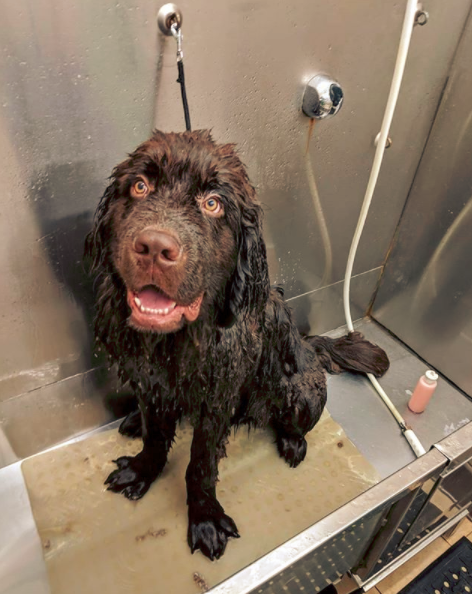Contents
Allergies are responsible for affecting the quality of life of Newfoundland dogs. There can be various types of allergies in Newfoundland dogs. The types of allergies in Newfoundland dogs are majorly dependent on the type of allergen with which they are being exposed.
Skin allergies in Newfoundland dogs can be determined quite easily. Among different types of allergies in Newfoundland dogs, skin allergies in Newfoundland dogs are quite obvious, visible, and frequent.
In addition to this, food allergies in Newfoundland dogs may occur. For the food allergies in Newfoundland dogs, the causative agent is undoubtedly the food that is being fed to the giant dog.

Hence, owners must be capable enough to figure out what is the best food for Newfoundland dogs to avoid allergies. In this pet guide, you would get to know the details of common allergies in Newfoundland dog, acute allergic reactions, symptoms of allergies in Newfoundland dog,
diagnosing allergies in Newfoundland dog, treating allergies in dogs, and best products for Newfoundland dog allergies. Let’s have a rapid glimpse of such details!
Types of Allergies in Newfoundland dogs:
The most common types of allergies in Newfoundland dogs are food allergies, seasonal allergies, skin allergies, etc. Allergen when enters the body, then it triggers the allergic response, and symptoms of the allergy are observed.
Environmental allergy can be avoided by preventing contact from environmental allergens. Similar is the case with all the allergy types.
The antigen-antibody response is seen in the case of allergy. It is basically the response of the immune system that is seen as a response to exposure to allergens in Newfoundland dog’s body.
Skin Allergies in Newfoundland dogs:
This type of allergy is popularly known as allergic dermatitis. It involves environmental allergens, food allergy, and flea dermatitis allergy.
When the flea bites the dog then fleas dermatitis allergy occurs. Skin allergies are not hard to identify at all.
Treating it is also easy with the use of oral or topical medications. In the case of seasonal or environmental allergy, the allergens are usually pollen grains, dust, dirt, etc.
Food Allergies in Newfoundland dogs:
Food allergy is different from food tolerance. In true food allergy, the living being usually generates an immune response while in case of food intolerance, the dog is unable to endure certain ingredients of the food.
Hence, they depict a slow reaction to such substances as milk, eggs, corn, soy, etc.
What are the best foods for Newfoundland dogs to avoid allergies?
The best food for Newfoundland dogs to avoid allergies is hypoallergenic food. Provide an allergen-free diet to the dog. After identifying eh allergen, eliminate it from the dog diet. Feed the dog on a grain-free diet.
Consider feeding it on Sweet Potato and Venison Grain-Free Food, Pinnacle Grain Free Salmon, Blue Buffalo Basics food. Add antioxidants to the diet of Newfoundland dogs. Ensure to provide plenty of water to Newfoundland dogs. The usual average weight of Newfoundland dogs can reach up to 150 pounds.
Acute Allergic Reactions:
Dogs may have chronic as well as acute allergic reactions. Acute allergic reactions may lead to an alarming situation. Newfoundland dogs may suffer from anaphylactic shock in acute allergic attack and it proves to be lethal if left untreated.
Major factors leading to such a reaction are reactions of vaccines and bees sting. Facial swelling and development of hives are generally observed in case of allergy. Take the pet immediately to the vet for treatment in this crucial stage.
Symptoms of Allergies in Newfoundland dog:
Allergy is such a disease in which symptoms are quite obvious. The general symptoms that help you to identify the allergy in Newfoundland dog are hives, swelling on ears or earflaps, chronic ear infection, swelling on lips, diarrhea, itchy eyes, itchiness, licking, swelling of the face, redness, vomiting, runny eyes, swelling of eyelids, sneezing, and runny nose.
If your Newfoundland dog is having such symptoms then you should make an appointment with the vet for a medical check-up.
Diagnosing Allergies in Newfoundland dog:
When it comes to the diagnosis of allergies in the pet, then it is found out to be a complicated process. In order to diagnose the allergy in Newfoundland dogs, the vet has to figure out the causative agent or allergen.
Allergy test, blood test, elimination diet et car the ways to diagnose an allergy. An elimination diet is followed for a period of about 12 weeks in order to determine the food allergy.
Similarly, flea allergy dermatitis is diagnosed quite conveniently by killing the flea and finding out that either the condition of the dog is better or not.
Treating Allergies in Dogs:
In order to treat allergy in Newfoundland dogs, you need to prevent the exposure of allergens forms the dog. Similarly, lifestyle modifications is another way of treatment.

Besides this, medication therapy works the best for it. Vet often recommend antiallergy medication such as antihistamines to the Newofudnaldn dog for treatment of allergy.
Best products for Newfoundland dog allergies:
The owners of Newofudnaldn dog should try their best to provide the best quality food to them. While grocery in the Supermarket, ensure to keep your hands on chemical-free food. After figuring out the food that causes allergy in the dog, ensure to not provide such meal to the dog in the diet.
Did you ever observe such symptoms, especially redness and itching in your Newofudnaldn dog? What symptoms do you observe in Newfoundland dogs during such allergies?

How do you treat common allergies in Newfoundland dogs? Did your vet inform you about such allergic reactions that might occur in Newfoundland dog and tell you the precautions to be taken?
If yes, then share your experience regarding the common allergies in Newfoundland dogs in the comment section below. We are eager to know about your experience!
Besides this common disease, there is another disease that is deadly and is known to be the leading cause of death in Newfoundland dogs. This genetic disease is none other than cancer.
There are various types of cancer that Newfoundland dog is prone to have. Click on Cancer in Newfoundland dogs in order to know more details of this fatal disease!
video credit youtube channel:Mercola



